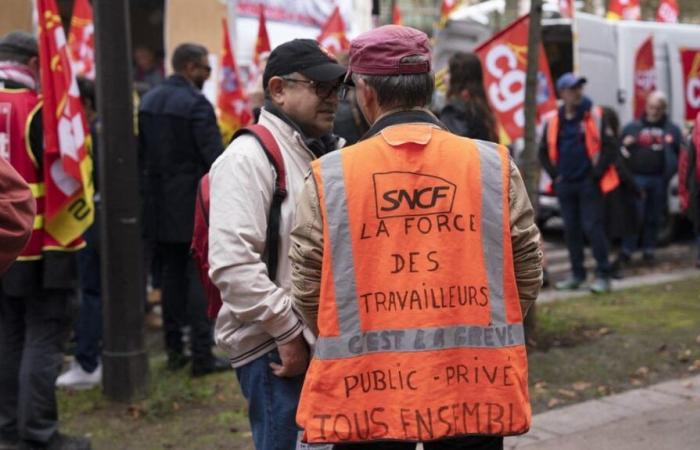
The company's four unions are calling for a first 24-hour walkout on Thursday, before a repeat movement in December. In their sights: the dismantling of freight and the opening to competition of regional lines, in particular.
They are getting ready to bring out the banners and the megaphones. After a first day of mobilization on Thursday, November 21, the four SNCF unions filed a strike notice for a renewable and unlimited movement from December 11. That's ten days before the Christmas holidays. In a joint press release, the CGT-Cheminots, Unsa-Ferroviaire, SUD-Rail and the CFDT-Cheminots say they regret the lack “inflection” of the group's management. In their sights: the announced dismantling of the freight subsidiary, the breakup of the company into private subsidiaries, as well as the opening of regional lines to competition. But they also seek to influence salary negotiations while management must unveil its proposals on Wednesday. Franceinfo summarizes why railway workers are calling for a strike.
They refuse the dismantling of the freight subsidiary
The four unions representing SNCF are asking management to reverse its decision to dismantle its Fret SNCF subsidiary. The leading rail freight company in France will disappear on January 1, 2025 to be reborn in the form of two separate companies, called Hexafret for freight transport and Technis for locomotive maintenance.
Trade union organizations are calling for a moratorium, “to allow the different players to get back around the table and find ways to guarantee not only the continuity of Fret SNCF, but also its development in the longer term.” “This moratorium is essential given the suffering of our freight colleagues”they argue in a joint press release.
For Thomas Cavel, general secretary of the CFDT-Cheminots, “there must be a window of discussion that opens to move towards a decision that is more in line with the collective interest.”
“We are well ahead of Christmas. Between now and vacation departures, there is more than a month and a half. This is a chance given to social dialogue.”
Thomas Cavel, general secretary of the CFDT-Cheminotsà l'AFP
“We have colleagues who have worked their whole lives, for 20, 25 years, for the public company Fret SNCF, and on January 1,” everything stops, regrets Julien Troccaz, the SUD-Rail federal secretary, contacted by AFP. “Today, our colleagues do not know how things will happen on January 1. They know that they will be in private companies, but they do not know their social rights. So obviously, there is suffering. ”
They are against the opening of regional lines to competition
Added to the SNCF Freight file is the privatization of regional lines, the TER, Transilien and other Intercités. From mid-December, “more than 1,500 railway workers will be transferred” either with competitors like Transdev, or “in private law subsidiaries that SNCF creates when it could have made a choice of continuity”contests Julien Troccaz, federal secretary SUD-Rail, in West France. Consequence for them: “They will no longer benefit from the social framework that exists at the SNCF.” These SNCF subsidiaries were in fact created to respond to TER calls for tenders launched by the regions which have decided to open their rail network to competition.
More broadly, the unions denounce in their press release “a trajectory of fragmentation and balkanization of the network”. They point the finger “privatization in TER, Transilien and Intercités activities” as well as “the breakup of SNCF Réseau” under the effect of opening to competition. “The 2018 law certainly reduced the SNCF of 35 billion euros in debt, but it also transformed the SNCF public industrial and commercial establishment into a limited company (SA). This SA, 100% owned by the State , is itself a shareholder in a multitude of companies, including Fret SNCF, all managed independently.reminds The World.
The unions deplore a “strategy of internal social dumping assumed by the group, with the consequence of an atomization of social rules in the multiple rail SMEs that management intends to create for each lot open to competition”.
They want to influence the next salary negotiations
This mobilization also has another goal: to influence future salary negotiations which concern the 150,000 railway workers. Management must also unveil its proposals on Wednesday, November 20. These negotiations promise to be extremely difficult: over the last three years, railway workers have obtained between 5 and 6% increase per year, with management following the course of inflation. For 2025, with price increases slowing to around 1.5%, management's proposal will, in fact, be lower.
“To prepare minds for this landing, management has set up, in recent months, an observatory of remuneration and social benefits. The idea is to encourage railway workers not to stop at just salary, but to take into account the entire 'package' of benefits (free tickets, works council, mutual insurance, etc.)”explains Fanny Guinochet, economics specialist at franceinfo.
But the unions highlight the record profits of the TGV: 1.3 billion euros in 2023. The unprecedented attendance figures have in fact enabled the company to be profitable for the third consecutive year. “The question of the profits made by the company, in fact, must go to the employees. The billions which go into this must go to the railway workers in terms of general salary increases”estimates Thierry Nier, general secretary of the CGT railway workers, interviewed by TF1.





